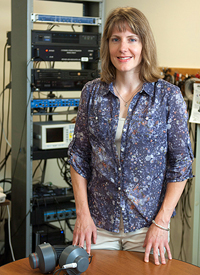Feature Story
Health Center Today, August 10, 2011
Does Your Hearing Do the Job?
By Cindy Weiss, CLAS Today

Jennifer Tufts, assistant professor of communications sciences.
Photo by Daniel Buttrey
How well do you need to hear in order to do your job, and how should your hearing be measured?
These are growing concerns for audiologists and institutions such as the military, with service members in Afghanistan and Iraq experiencing temporary or permanent hearing losses in combat.
The current standards and tests of “auditory fitness for duty” (AFFD) are being questioned, and a UConn audiologist is actively involved in this emerging area of research.
The problem is “more complex than you might think,” says Jennifer Tufts, associate professor of communication sciences in the College of Liberal Arts and Sciences. Her review two years ago in the Journal of the American Academy of Audiology of what is known about AFFD is being heavily cited, as audiologists try to determine what level of speech and hearing capability is needed for particular jobs.
At a recent conference in San Diego sponsored by the Department of Defense, her paper, named one of the “Best of 2009” by the Hearing Journal, was the starting point for discussion.
Researchers have known for some time that it’s possible to have normal hearing on tests but abnormal speech understanding. But, as her paper pointed out, the expectation is that most people with normal hearing on a pure-tone audiogram test (the test you take in a soundproof booth, listening for beeps through a headset) have normal speech understanding, so they get the go-ahead for jobs.
Soldiers returning from Iraq and Afghanistan with traumatic brain injuries from exposure to blasts are not meeting that expectation, however.
“Anecdotally, a common complaint among these veterans is difficulty understanding speech in noise in spite of normal hearing thresholds,” she wrote.
The Army and Air Force profiles for determining whether a service member is deployable do not require even normal hearing—they allow a mild to moderate hearing loss on the audiogram tests. But those tests, which are now being questioned for AFFD purposes, do not account for the chaotic hearing conditions that soldiers experience in combat.
They don’t match conditions found in many jobs, either. Pilots, miners, police, firefighters, truck drivers, and manufacturing workers in noisy environments are among those who can endanger themselves or others if they cannot hear and comprehend speech in noisy or emergency situations.
The challenge for audiologists, Tufts says, is to find new standards and tests that adequately measure the hearing levels needed for safe and effective job performance.
Clinical audiologists are urgently seeking new tests of fitness for duty, she said, but research audiologists face formidable challenges, since different jobs have different noise levels and hearing requirements. Some require a worker to hear and localize soft sounds (such as a criminal or an adversary approaching stealthily), while others require a person to distinguish speech, sometimes foreign, in chaotic emergency situations, or over a crackling radio or cell phone.
A truck driver should be able to hear sirens, but what if a driver’s long experience increases his or her watchfulness for flashing lights? Is a mild hearing loss then acceptable?
AFFD standards for some jobs allow people to have hearing in only one ear. But hearing in both ears is needed to be able to localize a sound—that is, to accurately determine where it is coming from. So experience won’t help a soldier with that type of hearing loss locate the sound of a sniper.
“Where is the point where your hearing ability becomes a disability?” asks Tufts. “We don’t want to be too strict, but just because you have normal hearing doesn’t mean you can do higher level things.”
A violinist in a symphony orchestra, she wrote in her paper, has only about 30 seconds for a final tune-up on a noisy stage at the start of a performance. Failure to tune accurately would ruin the audience’s experience, so the stakes, and the hearing standards, are high.
A former violinist herself, as a music and math major at Holy Cross, she became interested in audiology and eventually held a postdoctoral research position at Walter Reed Army Medical Center before joining UConn in 2005.
All branches of the military are interested in the AFFD issue, says Tufts, who has received research funding from the Office of Naval Research and the Naval Submarine Medical Research Laboratory in Groton.
Manufacturing businesses are interested, too. She recently designed a field test of ear protectors for a plastics manufacturing plant in Rhode Island. Both the military, and some businesses, use hearing protection devices and are interested in new “smart” devices that block sounds harmful to the ears but can be turned on to function as hearing aids when soft sound discernment is required.
In the end, she says, the goal is clear. “We want people to be able to do their jobs—to be able to hear.”


